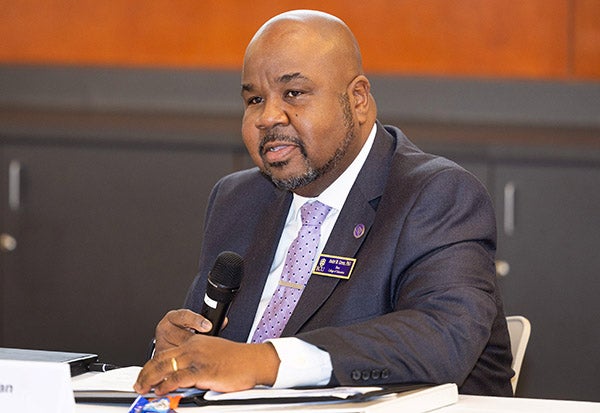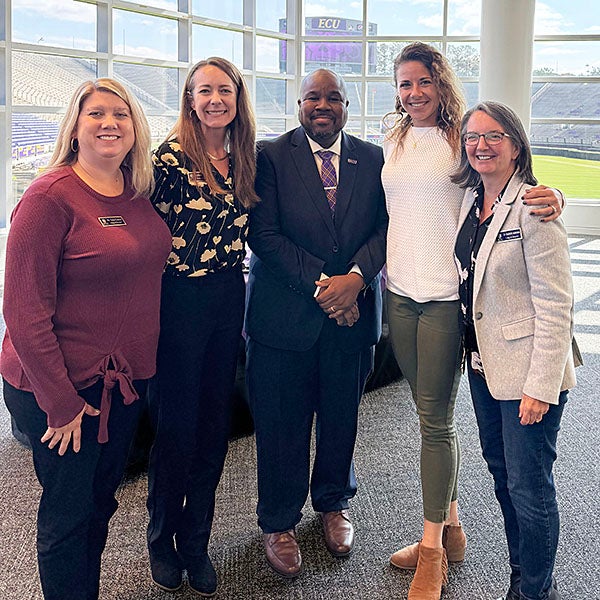Board of Education meeting highlights ECU alumni, literacy and builds connections
The North Carolina State Board of Education hosted its planning and work session and monthly meeting on East Carolina University’s campus Oct. 31-Nov. 2 giving the ECU College of Education a chance to build relationships and connections with stakeholders.

Dr. André Green, ECU College of Education dean, welcomed the North Carolina State Board of Education to ECU’s campus. (Photo by Rhett Butler)
“The North Carolina State Board of Education plays a pivotal role in shaping the educational landscape, and we’re privileged to have the honor of hosting you here today,” said Dr. André Green, dean of the ECU College of Education. “We are prepared to work with the state board and all of the people in North Carolina to produce the best teachers that we can because that one teacher can change the outcome of a child’s trajectory.”
One of the focuses of the planning and work session was literacy in elementary and middle grades, including how three eastern North Carolina districts implemented the Excellent Public Schools Act. This state law changed literacy instruction in elementary school classrooms and aimed to improve reading proficiency by the third grade by using the “science of reading” approach.
The three superintendents who presented — Dr. Otis Smallwood of Bertie County Schools, Dr. Tanya Turner of Perquimans County Schools and Dr. Matthew Cheeseman of Beaufort County Schools — are all alumni of ECU’s College of Education.
All three discussed having multi-tiered systems of support in place for the schools in their districts to ensure that literacy implementation was successful. Districts provided professional development for their educators, including Language Essentials for Teachers of Reading and Spelling (LETRS) training.
While many schools focused LETRS training on classroom teachers who teach English and language arts, Beaufort County Schools ensured elective teachers received training so that all educators were on board. Both Bertie County Schools and Perquimans County Schools implemented innovative tools to assess reading proficiency in the classroom and provide essential data for teachers to tailor their lessons.
“LETRS has been the core of our efforts to raise the expectations of literacy in our school district,” Turner said. “We have implemented literacy efforts in K-12 and we have an unwavering commitment to continue on this journey because we have seen the remarkable results that have occurred due to our efforts.”

Faculty from the Department of Literacy Studies, English Education and History Education, and College of Education leadership attended the planning and work session of the state BOE meeting. From left, Tanya Cannon, Dr. Elizabeth Swaggerty, Dr. André Green, Erin Kessel and Dr. Kimberly Anderson listened to the second day of sessions focused on literacy. (Contributed photo)
ECU literacy studies faculty attended the planning session for an inside look at how literacy education is being discussed at the state board level as well as in classrooms across the state.
“After listening to the presentations and participating in the discussions, I maintain confidence in ECU’s role in teacher preparation and faculty members’ expertise in literacy,” said Dr. Elizabeth Swaggerty, chair of the Department of Literacy Studies, English Education and History Education. “I am motivated to continue to engage in discussions about current and future literacy education policies and trends so we can maintain our focus on developing thoughtful, skilled reading teachers who understand the complexity and nuances of literacy learning.”
These sessions will also help ECU faculty prepare future teachers for what to expect in the classroom from both administrators and the types of programs and support that will be available to them.
“Hearing these success stories provides our faculty an opportunity to be aware of and ensure we are engaging ourselves in these programs,” said Erin Kessel, literacy studies teaching instructor. “Engaging our students in these programs will assist them when they take their first job as an educator as they will already be familiar with such programs.”
In addition to literacy, the state board discussed math instruction in K-8, a parents’ guide to student achievement, career and technical education, and data collected by the state. ECU faculty, staff and students sat in on sessions throughout the three days and reflected on how they relate to their future teaching and learning journeys. Chancellor Philip Rogers and Provost Robin Coger welcomed the board to ECU while relaying some of ECU’s history and accomplishments in the field of education.
“Our mission at ECU is to be a national model for student success, public service and regional transformation, and the North Carolina State Board of Education and ECU are aligned in our conviction that we are educating students not only for today, but for being effective in a globally collaborative society with all its complexities, today and in the future,” Coger said.